苏教版初二英语知识要点
初二英语上册知识点苏教版
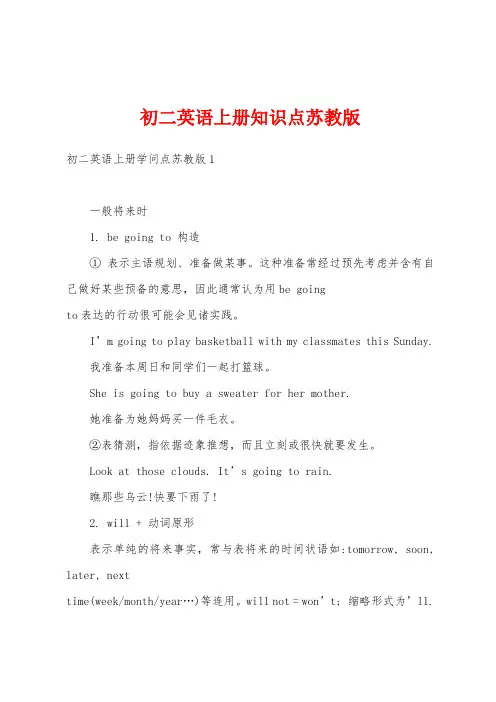
初二英语上册知识点苏教版初二英语上册学问点苏教版1一般将来时1. be going to 构造①表示主语规划、准备做某事。
这种准备常经过预先考虑并含有自己做好某些预备的意思,因此通常认为用be goingto表达的行动很可能会见诸实践。
I’m going to play basketball with my classmates this Sunday.我准备本周日和同学们一起打篮球。
She is going to buy a sweater for her mother.她准备为她妈妈买一件毛衣。
②表猜测,指依据迹象推想,而且立刻或很快就要发生。
Look at those clouds. It’s going to rain.瞧那些乌云!快要下雨了!2. will + 动词原形表示单纯的将来事实,常与表将来的时间状语如:tomorrow, soon, later, nexttime(week/month/year…)等连用。
will not = won’t; 缩略形式为’ll.①表示作出马上的打算。
这种意图并未经过事先的考虑或规划,是临时的一种打算。
---Please put your things away, Tom. 汤姆,把你的东西整理好。
---I’m sorry. I’ll do it right away. 对不起。
我立刻就去做。
②表示猜测。
指说话人对于将来的看法、假设和推想。
I’m sure our team will win next time. 我确信下次我们队会赢。
Maybe she will go to the gym. 或许她会去体育馆。
③表示许诺。
I’ll do better next time. 下次我会做得更好的”。
I’ll visit you tomorrow. 明天我会去看你的。
句式:确定句:I/She/He/They will go to play baseball soon.否认句:I/She/He/They won’t go to play baseball soon.一般疑问句:Will you/she/he/they go to play baseball soon?答复:Yes, I/she/he/they will. No, I/she /he/they won’t.3. 动词plan, come, go, leave等瞬时动词用现在进展时表示将要发生的事。
最新苏教版初中八年级英语知识点
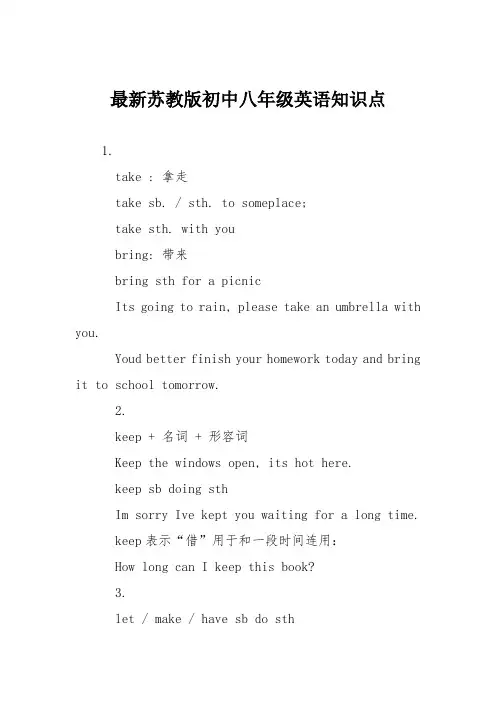
最新苏教版初中八年级英语知识点1.take : 拿走take sb. / sth. to someplace;take sth. with youbring: 带来bring sth for a picnicIts going to rain, please take an umbrella with you.Youd better finish your homework today and bring it to school tomorrow.2.keep + 名词 + 形容词Keep the windows open, its hot here.keep sb doing sthIm sorry Ive kept you waiting for a long time.keep表示“借”用于和一段时间连用:How long can I keep this book?3.let / make / have sb do sth让(使)某人干某事Lets go to the zoo!How did he make the baby stop crying?4.forget to do sth忘记去做某事remember to do sth记得去做某事forget doing sth 忘记做过某事remember doing sth记得做过某事5.stop to do sth停下来做另一件事情stop doing sth停止正在做的事情stop sb from doing sth阻止某人干某事Lets stop to have a test, its too hot today.When the teacher came into the classroom, the students stopped talking.We plant trees to stop the wind from blowing theearth away.begin / startto do sth6.tell / ask sb to do sth否定形式 tell / ask sb not to do sth.Policemen asked us not to play on the road , it was too dangerous.Our P.E. teacher told us a storyyesterday.7.see / hear / watch sb do sthsee/ hear /watch sb doing sthI heard him singing in the room when I passed by.8.enjoy sth ; enjoy doing sth ;enjoy oneself = have a good timeOur classmates went to the zoo last Sunday. They enjoyed themselves.9.be busy with sth;be busy doing sthThey are all busy with their work.10.finish doing sth.Tom didnt go to bed until he finished writing the composition.11.wantsth/to do sth/sb to do sthwould likesth/to do sth/sb to do sthfeel like doing sth.He didnt feel like eating anything.12.had better do sth否定形式:had better not do sthYoud better not sing here, the baby is asleep.13.Why not do sth ?=why dont you do sth ?=Why didnt you do sth ?Why not come with me?14.What about sth/what about doing sth ?=How about -----?How about playing basketball with us?15.Thank you for sth /Thanks for doing sth.Thanks for your help.------------Its a pleasure.Thanks very much for helping me.16.instead往往放在句首或句尾instead of sth/instead of doing sth.通常放中间He didnt go to the park. He went to the cinema instead.He went to the cinema instead of going to the park..完成了小学阶段的学习,进入紧张的初中阶段。
苏教版八年级英语上册知识点
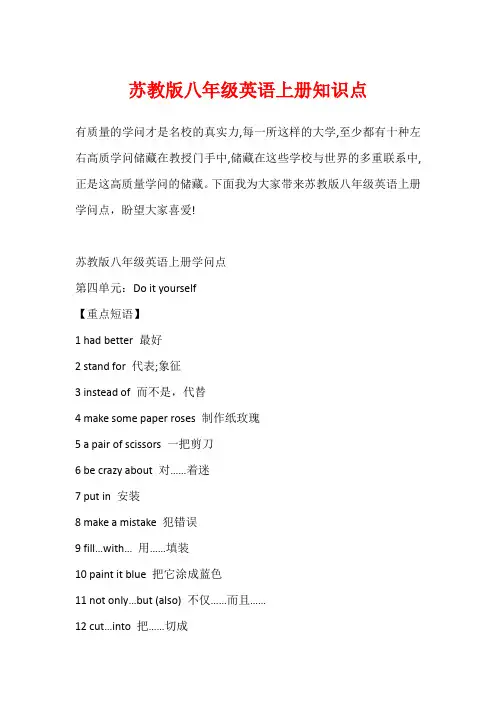
苏教版八年级英语上册知识点有质量的学问才是名校的真实力,每一所这样的大学,至少都有十种左右高质学问储藏在教授门手中,储藏在这些学校与世界的多重联系中,正是这高质量学问的储藏。
下面我为大家带来苏教版八年级英语上册学问点,盼望大家喜爱!苏教版八年级英语上册学问点第四单元:Do it yourself【重点短语】1 had better 最好2 stand for 代表;象征3 instead of 而不是,代替4 make some paper roses 制作纸玫瑰5 a pair of scissors 一把剪刀6 be crazy about 对……着迷7 put in 安装8 make a mistake 犯错误9 fill…with… 用……填装10 paint it blue 把它涂成蓝色11 not only…but (also) 不仅……而且……12 cut…into 把……切成13 for example 例如14 next door 在隔壁15 tidy up 整理好16 keep it secret 保密17 keep doing sth. 反复做某事18 in the end 最终【重点句型】1 Here are clear instruction. 这儿有清晰的指示、2 You’d better get some tools. 你最好拿一些工具3 When you do DIY, you make, repair of decorate things yourself instead of paying someone to do it. 当你‘自己动手做’的时候,你自己做,修理或装饰东西,而不是付钱给别人做。
4 Now the living room has not only blue walls but also a blue ceiling and floor. 此时此刻起居室不仅是蓝色,连天花板和地板也是蓝色。
苏教版八年级上册英语知识点汇总

苏教版八年级上册英语知识点汇总一、词汇与短语1.高级词汇扩展:在七年级基础上,进一步学习并掌握更多高级词汇,涵盖更广泛的主题,如自然环境、科技、文学、历史、社会现象等。
2.短语与固定搭配:积累并熟练运用常用的短语、固定搭配和习惯用语,以增强语言表达的准确性和地道性。
二、语法知识1.时态深化:o一般过去时与现在完成时的对比:深入理解两种时态的区别,学会在适当语境中使用。
o过去进行时:学习并掌握过去进行时的用法,描述过去某个时间点正在进行的动作。
o将来时态:复习一般将来时,并引入新的将来时态表达法,如be going to, will等。
2.被动语态:学习并掌握一般现在时、一般过去时、一般将来时的被动语态,理解其用法和构成。
3.条件句:引入条件句的概念,学习零条件句(if...will...)、第一条件句(if...do...will...do...)的基本用法。
4.从句:初步接触并学习宾语从句、状语从句(如时间状语从句、原因状语从句)的用法和构成。
5.非谓语动词:了解动名词、不定式和分词(现在分词、过去分词)的基本概念和用法。
三、听力与口语1.听力技能提升:通过多样化的听力材料(如对话、短文、新闻、讲座等),提高学生的听力理解能力,包括捕捉关键信息、理解隐含意义等。
2.口语表达:加强口语训练,通过角色扮演、小组讨论、辩论等形式,提高学生的口语表达能力和交际技巧。
3.发音与语调:继续注重发音的准确性和语调的自然性,通过模仿、跟读等方式,提高学生的语音语调水平。
四、阅读与写作1.阅读技巧:培养学生快速阅读、仔细阅读、批判性阅读等多种阅读技能,通过阅读不同体裁的文章(如记叙文、说明文、议论文等),提高阅读理解能力。
2.阅读策略:引导学生学会预测、概括、推断等阅读策略,提高阅读效率和深度。
3.写作技巧:学习并掌握不同文体的写作技巧(如书信、日记、议论文等),通过写作练习,提高学生的写作能力。
4.写作过程:引导学生经历构思、起草、修改、校对等写作过程,培养良好的写作习惯。
初二英语上册知识点苏教版
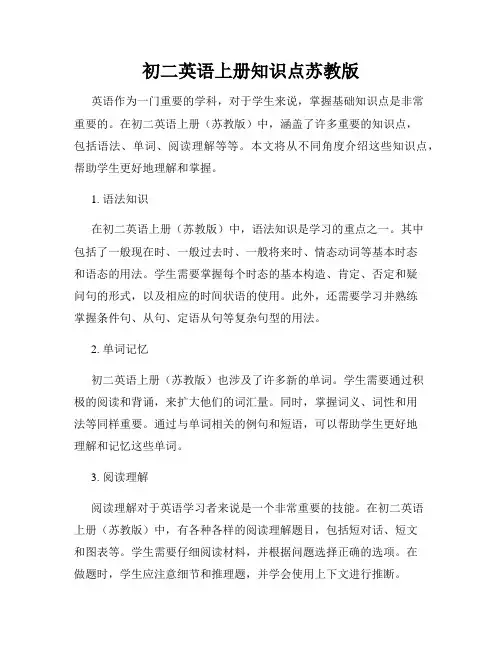
初二英语上册知识点苏教版英语作为一门重要的学科,对于学生来说,掌握基础知识点是非常重要的。
在初二英语上册(苏教版)中,涵盖了许多重要的知识点,包括语法、单词、阅读理解等等。
本文将从不同角度介绍这些知识点,帮助学生更好地理解和掌握。
1. 语法知识在初二英语上册(苏教版)中,语法知识是学习的重点之一。
其中包括了一般现在时、一般过去时、一般将来时、情态动词等基本时态和语态的用法。
学生需要掌握每个时态的基本构造、肯定、否定和疑问句的形式,以及相应的时间状语的使用。
此外,还需要学习并熟练掌握条件句、从句、定语从句等复杂句型的用法。
2. 单词记忆初二英语上册(苏教版)也涉及了许多新的单词。
学生需要通过积极的阅读和背诵,来扩大他们的词汇量。
同时,掌握词义、词性和用法等同样重要。
通过与单词相关的例句和短语,可以帮助学生更好地理解和记忆这些单词。
3. 阅读理解阅读理解对于英语学习者来说是一个非常重要的技能。
在初二英语上册(苏教版)中,有各种各样的阅读理解题目,包括短对话、短文和图表等。
学生需要仔细阅读材料,并根据问题选择正确的选项。
在做题时,学生应注意细节和推理题,并学会使用上下文进行推断。
4. 写作技巧写作是英语学习的一项基础技能。
初二英语上册(苏教版)中,学生需要学习如何写作不同类型的文章,比如作文、书信等。
在写作方面,学生应注意语法和拼写的正确性,同时也要注重段落结构和连贯性。
另外,一些常用的表达和过渡词语也需要掌握,以提高写作的流畅程度。
总结起来,初二英语上册(苏教版)中的知识点涉及到语法、单词、阅读理解和写作技巧等。
学生需要通过不断学习和实践,掌握这些知识点,并在实际应用中提高自己的英语水平。
通过积极的阅读和写作训练,学生可以提高自己的英语能力,更好地应对学习和生活中的各种挑战。
让我们一起努力,打好英语基础,取得优异的成绩!。
初二苏教版英语知识点总汇
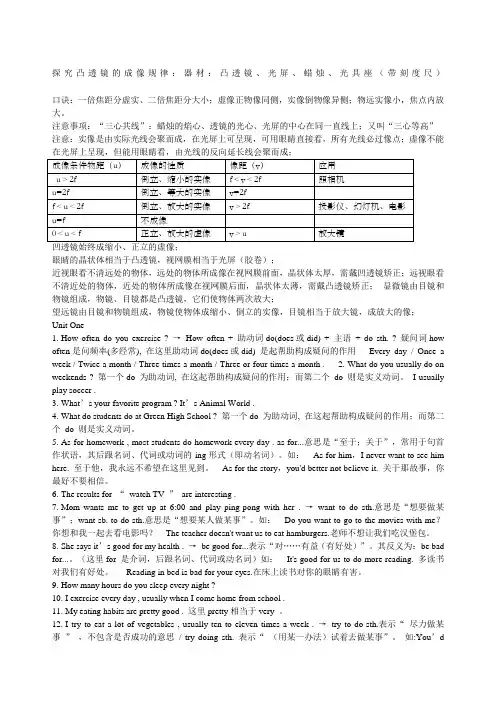
探究凸透镜的成像规律:器材:凸透镜、光屏、蜡烛、光具座(带刻度尺)口诀:一倍焦距分虚实、二倍焦距分大小;虚像正物像同侧,实像倒物像异侧;物远实像小,焦点内放大。
注意事项:“三心共线”:蜡烛的焰心、透镜的光心、光屏的中心在同一直线上;又叫“三心等高”注意:实像是由实际光线会聚而成,在光屏上可呈现,可用眼睛直接看,所有光线必过像点;虚像不能在光屏上呈现,但能用眼睛看,由光线的反向延长线会聚而成;眼睛的晶状体相当于凸透镜,视网膜相当于光屏(胶卷);近视眼看不清远处的物体,远处的物体所成像在视网膜前面,晶状体太厚,需戴凹透镜矫正;远视眼看不清近处的物体,近处的物体所成像在视网膜后面,晶状体太薄,需戴凸透镜矫正;显微镜由目镜和物镜组成,物镜、目镜都是凸透镜,它们使物体两次放大;望远镜由目镜和物镜组成,物镜使物体成缩小、倒立的实像,目镜相当于放大镜,成放大的像;Unit One1.How often do you exercise ? →How often + 助动词do(does或did) + 主语+ do sth. ? 疑问词how often是问频率(多经常), 在这里助动词do(does或did) 是起帮助构成疑问的作用Every day / Once a week / Twice a month / Three times a month / Three or four times a month .2. What do you usually do on weekends ? 第一个do 为助动词, 在这起帮助构成疑问的作用;而第二个do 则是实义动词。
I usually play soccer .3.What’s your favorite program ? It’s Animal World .4.What do students do at Green High School ? 第一个do 为助动词, 在这起帮助构成疑问的作用;而第二个do 则是实义动词。
2023年苏教版八年级英语下册期末复习知识点总结
2023年苏教版八年级英语下册期末复习
知识点总结
1. 语法知识点
- 定冠词与不定冠词的用法
- 一般现在时、一般过去时、现在进行时的基本用法
- 比较级和最高级的形式及用法
- 情态动词的用法
- 直接引语和间接引语的转换方法
- 疑问词的使用
- 主从复合句的构成和连接词的使用
- 各种从句的用法
2. 阅读理解技巧
- 阅读文章前先浏览题目,了解要求
- 精读文章,注意关键词的理解
- 利用上下文推断词义
- 注意文章中的信号词
- 根据问题定位和筛选信息
- 逻辑推理和综合分析题目
3. 写作技巧
- 写作时要注意语法和拼写错误
- 平时多练写作,积累词汇和表达方式- 注重作文结构的合理性
- 使用恰当的过渡词和连接词
- 注意逻辑清晰和行文连贯
- 介绍人物时要注意时间顺序和事件发展- 列举理由时要用合适的过渡词和连接词- 写作时要注意使用恰当的时态
- 保持作文的简洁明了
4. 口语表达技巧
- 研究常用口语表达和日常用语
- 多参与口语练,提高口语流利度
- 提前准备一些口语话题,增强自信
- 注意发音和语调的准确性
- 注重语速和语音的连贯性
- 学会倾听和回应他人的询问
5. 听力技巧
- 熟悉常见的听力题型
- 多听英语材料,提高听力理解能力
- 注意区分关键信息和次要信息
- 注意抓住主旨和关键词
- 多进行模拟测试,提高应对能力
以上是苏教版八年级英语下册期末复的一些重点知识和技巧,希望能对你的备考有所帮助。
苏教版八年级上册英语unit1知识点
苏教版八年级上册英语unit1知识点苏教版八年级上册英语Unit 1 知识点Unit 1 是苏教版八年级上册英语的第一个单元,主要涉及到“School life”和一些相关的话题。
本文将介绍Unit 1 的主要知识点。
一、单词1. school supplies 学习用品2. bulletin board 公告栏3. bell 钟声4. extracurricular activities 课外活动5. cafeteria 自助餐厅6. curriculum 课程7. locker 储物柜8. schedule 课程表9. principal 校长10. student council 学生会二、短语1. go to school 上学2. have classes 上课3. study hard 努力学习4. take notes 记笔记5. join a club 参加俱乐部6. play sports 运动7. eat lunch 吃午饭8. make friends 交朋友9. do homework 做作业10. get good grades 取得好成绩三、语法1. 一般现在时一般现在时表示经常性或习惯性的行为,以及真理和事实。
例如:I go to school every day.(我每天上学)2. 物主代词物主代词用来表示所属关系。
例如:This is my book.(这是我的书)3. 不定冠词不定冠词指代未被确定的人或物。
例如:I have a pen.(我有一支笔)4. 介词 ofof 用来表示所属关系或从属关系。
例如:The name of the school is Lincoln Middle School.(这个学校的名字是林肯中学)四、对话本单元的对话主要围绕 School life 展开,包括上课、吃饭、课外活动等。
例如:A: Hi, Tom. What do you have first period?B: Hi, Li. I have English. What about you?A: I have math. Do you like English?B: Yes, it's my favorite subject. Do you like math?A: No, I don't like it at all. But I have to study hard for the test tomorrow.B: Good luck with that.五、阅读本单元的阅读材料包括一篇有关“校园活动”的文章,以及一个有关校规的表格,并要求学生根据表格内容写一篇短文。
最新苏教版初二年级英语复习知识点
苏教版初二年级英语复习知识点Its +adj +(for sb) to do sth (强调做某事怎样)Its + adj + of sb + to do sth (强调某人怎样)Unit 3 What are you doing for vacation?1.babysit = look after =take care of照顾2.relax at home在家休息relaxing 放松的(形容事物)relaxed放松的(形容人)4.decide to do sth决定做某事= make a dicision to do sth= make up ones mind to do sthdecide on sth 选定某物decide on doing sth 选定做某事5. for vacation = on vacation = take / spend / have a vacation度假6. plan to do sth计划做某事make a plan 制定计划7.cant wait to do sth迫不及待做某事8.spend on sth = spend in doing sth花费时间/金钱做某事9.sleep a lot睡足 sleep late 睡懒觉10.ask sb about sth 寻问某人某事ask sb(not) to do sth=tell sb (not) to do sth 叫某人(别)做某事Unit 4 How do you get to school?1. get to school = arrive at school = reach school到达学校2.take a taxi 乘出租汽车ride a bike 骑自行车by bike = on the bike 骑自行车by car = in a car 乘小汽车by bus = on the bus 乘公共汽车by boat = in a boat 乘船on foot 步行3.leave for +某地前往+某地leave +某地离开某地4.have a quick breakfast 匆忙地吃早饭5.depend on 依靠决定于6.around the world全世界=all over the world7.not all students = some students 并非所有的学生8.have to do sth = must do sth 不得不做某事9.a number of = a lot of 许多(作主语,谓语用复数)10.the number of....的总量 (作主语,谓语用单数)完成了小学阶段的学习,进入紧张的初中阶段。
苏教版初二英语Unit1知识概要
苏教版初二英语Unit1知识概要八上Unit1一、重要单词用法名词:secret 秘密magazine杂志lie 谎言joke 玩笑voice 嗓音singer 歌手sense 感觉,观念,意识height 高度weight 重量competition 竞赛,比赛,竞争test 测试swimmer 游泳者plan 计划动词:care关注,关心,在意make 成为,适合trust信任fit 可容纳,装进knock 碰,撞:把…撞击成choose 选择,挑选形容词:thirsty 口渴的honest 诚实的;正直的good-looking 好看的tidy 整洁的polite礼貌的true确实的,的确generous大方的round圆形的bored无聊的straight笔直的sweet可爱的,惹人怜爱的worst(bad的最高级)最差,最糟social社会的humorous幽默的shy害羞的square方形的smiling微笑的,带着笑意的handsome英俊的fat 胖的hard-working勤奋的,工作努力的patient耐心的unhappy不快乐的excellent杰出的,极好的副词:almost几乎,差不多代词:yourself你自己缩写词:sec. (=second)秒兼类词:smile vi. &n. 微笑二、常见词组1.have something to drink 喝点什么东西2.keep a secret 保守秘密3.make sb. happy使某人快乐4.share one’s joy 分享某人的快乐5.care about 关心,关怀6.be ready to 乐意7.tell lies说谎8.tell funny jokes 讲有趣的笑话9.one of………中的一个10.b e willing to do sth. 愿意做某事11.s haresth. with sb. 和某人分享某物12.g ive one’s seat to sb. 给某人让座13.i n need 需要14.g row up 长大;成年15.m ake sb. look smart/laugh 使某人看上去聪明/使某人笑16.h ave a good sense of humour富有幽默感17.s ay a bad word about sb. 说某人的坏话18.b e kind to sb. 对……和善19.i n the future 在将来20.c hoose sb. as…选某人当……21.o f the six students 在六个学生中22.d rawing competition 绘画竞赛23.t ravel around the world 环游世界24.b oth.. and…两个都;既……又……25.b e good at doing sth. / do well in doing sth. 擅长做某事三、经典句型1.You can trust them because they never tell lies.你能信任他们因为他们从不说谎。
- 1、下载文档前请自行甄别文档内容的完整性,平台不提供额外的编辑、内容补充、找答案等附加服务。
- 2、"仅部分预览"的文档,不可在线预览部分如存在完整性等问题,可反馈申请退款(可完整预览的文档不适用该条件!)。
- 3、如文档侵犯您的权益,请联系客服反馈,我们会尽快为您处理(人工客服工作时间:9:00-18:30)。
苏教版初二英语知识要点8A Unit 4词组、句型及语法复习提纲一、词组或短语1 看起来味道很美look delicious2 看起来像只白老鼠look like a white mouse3 叫它希望call her xiwang4 称重100克weigh 100 grams5 第一次走出她的家门go outside her home for the first time6 8个月前(常用于过去时)eight months ago8个月后(常用于过去时)eight months later7 不再not……any more=no more / not……any longer =no longer8 长成…… grow into…9 一天长达14个小时for up to 14 hours a day10 吃竹笋和竹叶eat bamboo shoots and leaves11 在野外生存survive in the wild12 没有住的地方have nowhere to live13 砍到,砍伐cut down (cut sth down=cut down sth )砍树cut down trees 注意:cut it/them down14 其中一些问题some of the problems15 将来in the future16 独自on one’s own = alone/by oneself17 处于危险之中(be) in danger18 把….拿走take…away (take sth away=take away sth )注意:take it/them away19 采取措施take actions 采取下列措施take the following actions20 采取措施做某事take actions to do sth21 保护大熊猫protect giant pandas22 了解很多有关…… learn a lot about…23 踩到一条蛇step on a snake24 使大熊猫的保护区变得更大make giant pandas reserves bigger25 建立更多的保护区build more reserves26 鼓励农民们离开大熊猫保护区encourage farmers to leave the giant panda reserves27 生活在野外live in the wild28 将某人单独留下leave sb. alone = leave sb. (all) by oneself= leave sb. on one’s own29 一直做某事keep doing sth让/保持某人一直做某事keep sb. doing sth.阻止某人做某事keep/stop sb. from doing sth.30 使某人或某物安全,不受威胁keep someone/something safe from danger31 生存下去stay alive = survive32 种植更多的竹子grow more bamboo33 转身而跑run the other way34 步行穿过雨林walk through a rainforest35 喂养动物(的过程)the feeding of animals36 寻找,搜寻hunt for = look around for37 在中午at noon38 为我班的报告获取足够的信息get enough information for my class report39 攻击人们attack people40 一次去北京动物园的参观 a visit to Beijing Zoo41 从水中捉鱼catch fish from the water42 一份关于野生生物的报告a report on wild animals43 好的视力、听力和嗅觉good eyesight, hearing and smell44 取乐for fun45 以家庭形式生活live as a family以团队形式一起劳动work as a team(以家族以式)过群居生活live in family groups46 性情温驯的动物peaceful animals47 生活区的丧失(the) loss of living areas48 用它们的骨头制成药make medicine from their bones(看不出原材料)用纸做成一个箱子make a box of paper (看出原材料)49 对某人友好be friendly to/towards sb.50 继续做(相同的)事continue to do sth. = go on doing sth. = go on with sth.51 占用土地take the land52 开发新的农田make new farmland(s)53 挣很多钱make a lot of money54 一次海豚表演a dolphin show55 如些..以致于..(常引导结果状从)…..so/such …..that…….以便;为了(常引导目的状从)……. so that…….56 (数量)变得越来越少get smaller and smaller57 做一个关于….的测试give a test on….58 在四个月的时候at four months59 对….感兴趣(延续性)be interested in对…产生兴趣(短暂性)become interested in60 又生了一个婴儿have another baby61 独自生活live alone=live (all) by oneself =live on one’s own62 由动物皮毛制成的衣服clothes made of animal fur63 失去某人的生命(死)lose one’s life = die64 其它人someone else65 象牙elephants’ tusks66 黑白相间的black and white67 第一次for the first time68 直立行走walk upright69 回到家return home =come back home归还return …= give…back70 四处运动move around71 在白天in the daytime72 感到害怕feel frightened = feel afraid二、重点句子及句型:1. If I don’t have food, I die. If I die, no one will look after you.2. Write a report on an animal in danger for the club newsletter.★3. I first saw the baby panda when she was only 10 days old.= I saw the baby for the first time at the age of 10 days.4. When Xi Wang was born, she weighed just 100 garms.当“希望”出生时,她只有100克。
5.Eight mother later,she was not a small baby any more.★6.At the very beginning, Xi Wang drank her mother’s milk for up to 14 hours a day.7.When Xi Wang was 20 months old, she had to look after herself because her mother had another baby.★8.Sadly, it is very difficult for giant pandas to survive in the wild.9.Here are some of the problems( that Xi Wang may have in the future.)★10.If farmers cut down trees and forests, giant pandas will have nowhere to live.★★11.Mothers often leave baby pandas for two whole days on their own.★12.We can take the following actions to protest giant pandas .★13.Encourage farmers to leave the giant panda reserves.鼓励农民离开大熊猫保护区。
14. I will see some beautiful birds if I walk through a rainforest.★15. We call her Xi Wang. It means “hope”.★16. She started to go outside her home for the first time.17. If hunters catch a giant panda, they will kill it for it’s fur.18. If tigers live in the wild, they hunt for their own food.★19.Tigers live as a family if they have babies.Wolves live in family groups if they are in the wild.狼在旷野中以家庭的形式群居。
★20.They are in danger because people like their fur and make medicine from their bones.21.I think you should not buy clothes (made of animal fur).★22.If farmers continue to make new farmland, wild animals won’t get enough food.如果农民继续开辟新的农田,那么野生动物将得不到足够的食物。
★23.Mother giant pandas have only one or two babies at a time.★24.Their number is getting smaller and smaller because their living areas are becoming farmland.他们的数量越来越少,因为他们的居住地正变成农田。
